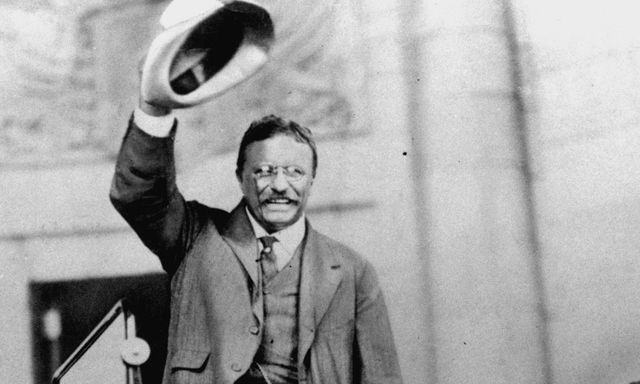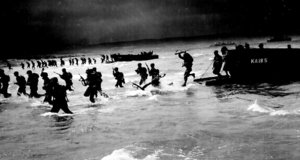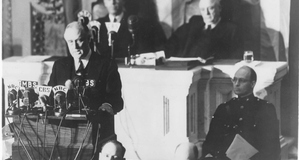Roosevelt's Imperialism: The Venezuelan Crisis, the Panama Canal, and the Origins of the Roosevelt Corollary
By
2015, Vol. 7 No. 03 | pg. 1/2 | » AbstractThe Roosevelt Corollary, outlined in Theodore Roosevelt’s 1904 and 1905 State of the Union addresses, proclaimed a new imperialist doctrine for American foreign policy in the western hemisphere and represents the culmination in the evolution of Roosevelt’s imperialist ideology. Roosevelt proclaimed the United States’ right to intervene in the internal affairs of any sovereign state in the western hemisphere if it conflicted with American interests in the region, and to resist European imperial ambitions in Central and South America, whether commercial or territorial, by force if necessary. Two events provided the impetus for Roosevelt’s imperial transformation: the Venezuelan Crisis of 1902-03 and the construction of the Panama Canal. The first because it raised the spectre of Germany acquiring a colonial foothold in the western hemisphere, while the second created a strategic American asset, and liability, in the region. It therefore became imperative for Roosevelt to assert and legitimize America’s hegemony in the region through the proclamation of the Roosevelt Corollary. The Evolution of the Roosevelt Corollary in State of the Union Speeches “We do not guarantee any state against punishment if it misconducts itself, provided that punishment does not take the form of the acquisition of territory by any non-American power.”1 (State of the Union, 1901)
“Any country whose people conduct themselves well can count upon our hearty friendship. If a nation shows that it knows how to act with reasonable efficiency and decency in social and political matters, if it keeps order and pays its obligations, it need fear no interference from the United States. Chronic wrongdoing, or an impotence which results in a general loosening of the ties of civilized society, may in America, as elsewhere, ultimately require intervention by some civilized nation, and in the Western Hemisphere the adherence of the United States to the Monroe Doctrine may force the United States, however reluctantly, in flagrant cases of such wrongdoing or impotence, to the exercise of an international police power.”2 (State of the Union, 1904)
“On the one hand, this country would certainly decline to go to war to prevent a foreign government from collecting a just debt; on the other hand, it is very inadvisable to permit any foreign power to take possession, even temporarily, of the customhouses of an American Republic in order to enforce the payment of its obligations; for such temporary occupation might turn into a permanent occupation.”3 (State of the Union, 1905) The Roosevelt Corollary, outlined in Theodore Roosevelt’s 1904 State of the Union address and expanded upon in his 1905 address to Congress as an amendment to the Monroe Doctrine, proclaimed a new interventionist doctrine for American foreign policy in the western hemisphere. In effect, the corollary stated the United States’ right to intervene militarily in the internal affairs of any sovereign state in the western hemisphere if it conflicted with American interests in the region. Roosevelt also asserted the right of the United States to resist European imperial ambitions in Central and South America, whether commercial or territorial, by force if necessary. As such, the Roosevelt Corollary fundamentally transformed the nature of United States foreign policy and represented the culmination in the evolution of Theodore Roosevelt’s imperialist objectives. Above all, the Roosevelt Corollary legitimized American imperialism by linking the doctrine of foreign intervention with the cornerstone of American foreign policy, the Monroe Doctrine, and as such represents an important transition in the development of the American Empire. Two events provided the impetus for Roosevelt’s imperial transformation; the first was the Venezuelan Crisis of 1902-03 and the second was the independence of Panama and the start of construction on the Panama Canal. This paper analyzes both events, contextualizes them within Roosevelt’s earlier and more limited interpretation of the Monroe Doctrine, and demonstrates their impact on the formation of the Roosevelt Corollary and more generally on the evolution of American imperialism at the beginning of the 20th century. Before examining the Venezuelan Crisis of 1902-03, a brief account of the Monroe Doctrine is necessary given that it formed the basis of United States foreign policy throughout most of the 19th century. Outlined by President Monroe in 1823, the doctrine was articulated largely in response to Spain’s attempts to reassert control over its former rebellious American colonies, which had seized upon Spanish weakness during the Napoleonic Wars to assert their independence.4 Put succinctly, the Monroe Doctrine outlined a policy of mutual non-interference; the United States would not interfere in European affairs and would respect existing European colonial possessions in the western hemisphere provided that the European great powers refrained from engaging in imperialist expansion in North and South America.5 However, the Monroe Doctrine remained largely unenforceable throughout most of the 19th century as the United States lacked the military power to actively resist European imperial ambitions in the western hemisphere.6 Nevertheless, the Monroe Doctrine committed the United States to a policy of resisting European imperialism in the western hemisphere, a fact which became increasingly significant as the country emerged as a great military and industrial power in its own right at the end of the 19th century. Roosevelt, upon ascending to the presidency in 1901 after the assassination of McKinley, did not initially challenge or expand upon the spirit of the Monroe Doctrine. In his first state of the union address on December 3, 1901, Roosevelt stressed that the United States only sought to resist European territorial ambitions in the western hemisphere. This can be evidenced by the relative restraint that Roosevelt showed in the face of European intervention, such as in Guatemala in 1901 and 1902.7 In this, Roosevelt can be seen as merely perpetuating the tradition of mutual non-interference outlined in the Monroe Doctrine. Yet, it should be noted that even at this stage Roosevelt was beginning to differ in his interpretation of the Monroe Doctrine. For example, Roosevelt left open the possibility, and indeed seemed to endorse, limited European intervention in the western hemisphere aimed at securing commercial concessions or financial indemnities, going so far as to state, “if any South American country misbehaves toward any European country, let the European country spank it!”8 That this implied complacency for foreign intervention in sovereign states, not merely European colonial possessions, is significant in that demonstrates Roosevelt’s imperialist sympathies, which conflicted with the anti-imperialist sentiment of the Monroe Doctrine. The first challenge to Roosevelt’s limited interpretation of the Monroe Doctrine was the Venezuelan Crisis of 1902-03. At first glance the crisis was rather standard; Venezuela defaulted on its foreign debt and Germany and Britain were determined to force Venezuela to repay its financial obligations by initiating a blockade of Venezuela’s coastal ports.9 The crisis was slow to emerge as negotiations between Germany and Britain over a joint strategy of action against Venezuela was protracted, which gave Roosevelt ample opportunity had he so wished to object to the venture.10 Roosevelt’s initial response to the unfolding crisis in Venezuela is interesting to note; at no point between the summer of 1901 and the beginning of the Anglo-German blockade did the Roosevelt raise any objections against the proposed intervention in Venezuela.11 For example, as early as December 1901, the German Ambassador Theodor von Holleben sent to the State Department outlining Germany’s intentions to blockade Venezuela ports and possibly occupy their custom houses in concert with Britain in order to force the Cuban government to repay its debts.12 Secretary of State John Hay replied to Holleben that although the United States deplored foreign intervention in the affairs of Latin and South American nations, he conceded that the British and Germans had a legitimate claim against Venezuela, that they were justified in their line of action, and that the United States would not interfere so long as the territorial integrity or sovereignty of Venezuela was violated.13 What made the Venezuelan blockade of 1902-03 unique from other instances of European intervention in Latin America was the perceived aggressive and potentially expansionist actions on the part of the German navy. This was brought to a head when the German gunboat Panther bombarded a Venezuelan custom house in San Carlos on 17 January 1903.14 This action was eerily similar to events in China in 1898, where the German navy had managed to extract a “temporary” concession from the Qing Dynasty in Kaiochow after a lengthy trade dispute, a concession which was quickly converted into a 99 year lease.15 The fears of Roosevelt were aroused; was Holleben’s solemn guarantee of Germany’s limited intentions merely a rouse to fool the United States into a false sense of complacency? What happened next is not quite clear; Roosevelt claimed that he sent an ultimatum to the German government warning them that unless they accepted arbitration he would order Admiral Dewy, out on maneuvers with the United States Fleet near Puerto Rico to attack the German fleet off Venezuela. 16 Though this is disputed, the results are clear; first Germany and then Britain agreed to arbitration at The Hague, and second Roosevelt demonstrated American naval power and political resolve to defend its interests in the region against foreign encroachment.17 Yet, though the Venezuelan Crisis was the catalyst for a re-evaluation of American foreign policy objectives, Roosevelt did not immediately formulate or articulate a new vision of American foreign policy in response to the crisis. The question that arises therefore, is that if Roosevelt’s opposition to European imperialism in the western hemisphere was based on purely ideological or moralist objections, why then did he chose not to articulate his corollary in his 1903 State of the Union address? That is not to say that he didn’t utilize the occasion to address the crisis in his speech, which he dwelt on at length. Rather it must be stressed that Roosevelt merely recounted the events of the Venezuelan Crisis, its satisfactory resolution, and noted that the dispute was currently before arbitration at The Hague.18 The significance of the crisis is that it established American military and political hegemony beyond a doubt over the Latin and South America; the Venezuelan crisis was the last serious attempt by any European great power to challenge the Monroe Doctrine. More than the Spanish-American War of 1898, the Venezuelan Crisis was the moment when the European great powers acknowledged the supremacy of the Monroe Doctrine, as well as the moment that the United States could effectively enforce it. In this sense the crisis marks an important phase in the development of America’s formal and informal empire in the western hemisphere. Yet, though a potentially dangerous precedent in itself, the Venezuelan Crisis on its own was not the catalyst for the Roosevelt Corollary, or rather it was not enough for Roosevelt to articulate such a doctrine publically even though it existed de facto. Rather, it was events in Columbia during 1903-04 which provided the impetus and necessity for a new imperialist foreign policy doctrine. In 1903, Roosevelt initiated negotiations with the Columbian government for the concession of a narrow strip of territory around the Isthmus of Panama for the express purposes of constructing a canal linking the Pacific and Atlantic Oceans. The negotiations resulted in the Hay-Herran Treaty, which was highly favorable to the United States, granting it jurisdiction around the Canal Zone and giving the United States the right to lease the territory for up to 100 years, with an option to renew the lease.19 The treaty was seen as having betrayed Columbian sovereignty and was immensely unpopular in Columbia, resulting in it being rejected by the Columbian Senate.20 The rejection of the Hays-Herran Treaty was perceived by Roosevelt as a great insult to American pride (Roosevelt went so far as to refer to them as “those contemptible little creatures”), a perception which was only compounded when the Columbian government made a counter-proposal which was financially favourable to them.21 In retaliation, Roosevelt supported an armed insurgency against the Columbian government in the Panama region, and when the rebellion was successful, promptly recognized Panama’s independence.22 Roosevelt justified his actions by claiming that he was giving Panama self-government and freeing them from Columbian oppression, although this was recognized as merely a façade even by contemporaries for Roosevelt’s impatience to acquire the Canal Zone and start construction on the Panama Canal.23 The independence of Panama from Columbia, and the subsequent lease of the isthmus to the United States for the purposes of the construction of the canal, gave the United States a new strategic asset and liability in the region. The strategic purpose of building a canal in Panama were obvious; it would allow the United States Navy to easily redeploy its naval forces from the Atlantic to the Pacific Ocean, or vis-versa by eliminating the need to circumvent South America, and thereby reducing the navy’s journey by roughly 7,000 miles.24 This in turn would allow the United States to play a greater role on the world stage as a major naval power, while also easing the burden of naval defense of the United States’ vast coastline. Yet, Panama was also a potential liability. In war the canal would be difficult to defend, as it was geographically isolated from the United States, and the burden for its retention would ultimately fall to the United States Navy. That the canal could only be seized in turn by a foreign naval force dictated that the United States had to prevent, if possible, the ability of European powers to deploy and station such naval forces in the pacific. Therefore, it became imperative for Roosevelt to prevent the acquisition of naval bases for European navies in the western hemisphere in order to ensure the defense of the Panama Canal. Though overarching in its language, the Roosevelt Corollary must also be seen as a specific reaction to the perceived imperialist ambitions of Germany in the western hemisphere. Alone of the major European powers, Germany still desired and possessed the naval capabilities to establish a colonial empire in the America’s. Spain, after her humiliating defeat in the Spanish-American War of 1898, was no longer a military threat.25 France had largely abandoned the region since the 1860s, and Britain had deferred to the Monroe Doctrine after the first Venezuelan Crisis in 1895.26 Admiral Tirpitz, Naval Secretary and architect of Germany’s naval expansion campaign, boasted openly of securing naval bases in Brazil, where 300,000 Germans lived, and in the Caribbean.27 Roosevelt’s concerns over a potential German naval threat were not entirely unfounded when one considers the relative sizes of the German and American Fleets. In terms of naval tonnage at the start of the Venezuelan Crisis, the United States was slightly ahead of Germany with 507,000 compared to only 458,000 tons respectively and had more tonnage under construction than any other nation except Britain (see Table I for further comparison of naval tonnage between the great powers).28 However, Germany had more battleships in commission, with 12 compared to only 8 for the United States.29 As a result, by the end of the decade Germany overtook the United States in terms of naval tonnage, becoming the second largest navy in the world after Great Britain (again see Table I). Nevertheless, this must be balanced with the realization of the logistical problems which would have hampered any attempt by the German navy to seriously challenge American naval hegemony in the Caribbean, and with the knowledge that Germany’s naval expansion was meant to challenge British rather than American naval strength. Table I: Warship Tonnage of the Powers, 1880-191430
Therefore, the Roosevelt Corollary must be seen in as both a response to a specific crisis and the articulation of Roosevelt’s own views on the pre-eminent role that he felt the United States should occupy in the western hemisphere. In his 1905 State of the Union address, Roosevelt alluded to the rational for his amendment to the Monroe Doctrine when he stated that it was “very inadvisable to permit any foreign power to take possession, even temporarily, of the customhouses of an American Republic”31, a direct reference to British and German attempts to seize the custom houses of Venezuela during their blockade. Viewed from this perspective, the rationale for the Roosevelt Corollary becomes clear. It aimed to eliminate the perennial problem of Latin American nations defaulting on their debts (as had happened during the Venezuelan Crisis), which provided the European great powers with an excuse for military intervention.32Continued on Next Page » Suggested Reading from Inquiries Journal
Inquiries Journal provides undergraduate and graduate students around the world a platform for the wide dissemination of academic work over a range of core disciplines. Representing the work of students from hundreds of institutions around the globe, Inquiries Journal's large database of academic articles is completely free. Learn more | Blog | Submit Latest in History |



















